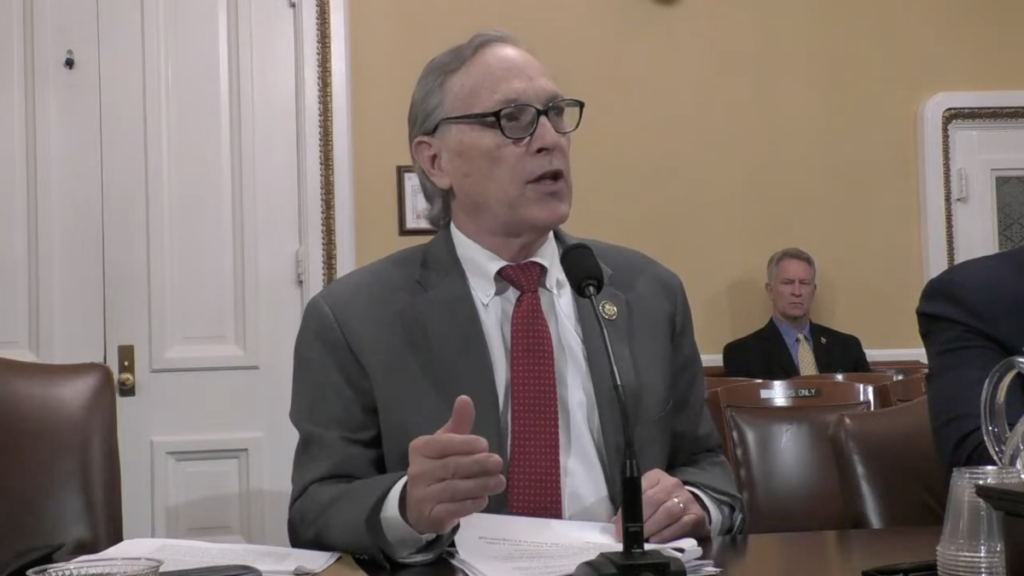Section 702, the controversial Foreign Intelligence Surveillance Act (FISA) authority used to justify snooping on Americans’ digital communications without a warrant, is set to sunset on April 19 if lawmakers don’t act. Many in Congress—including Republicans and Democrats—want Section 702 reauthorization that includes reforms to shield innocent Americans from warrantless surveillance and to hold federal agents accountable for misuse.
But as a “compromise” reauthorization measure comes before Congress this week, House Republicans are split on what sort of reform is really needed—and the side dismissive of civil liberties seems to be winning out.
“The House appears ready to reauthorize FISA 702—which has been abused literally hundreds of thousands of times to spy on Americans without a warrant—without requiring the government to get a warrant,” complained Sen. Mike Lee (R–Utah) on X (formerly Twitter) this week. A proposal put forth by Lee and Illinois Republican Sen. Dick Durbin would substantially limit warrantless access to communications obtained under Section 702. But House Speaker Mike Johnson (R–La.) “has declined to bring that bill to the floor, opting instead to have members vote on a ‘compromise’ measure—one that would compromise the rights of Americans if passed without amendments,” as Lee put it.
Johnson’s measure—H.R. 7888, the Reforming Intelligence and Securing America Act (RISAA)—was adopted 9 to 2 by the House Committee on the Rules yesterday.
RISAA and several amendments to it are now expected to get a full House vote tomorrow. And “the Senate is anticipated to pass whatever bill the House sends its way,” notes Axios.
RISAA Would ‘Actively Weaken Existing Protections’
RISAA is allegedly a compromise between the Protect Liberty and End Warrantless Surveillance Act ( H.R. 6570 ), which was passed by the House Judiciary Committee, and the Intelligence Committee’s preferred bill, known as the FISA Reform and Reauthorization Act of 2023 ( H.R. 6611). But in actuality, it leans much more heavily into the intelligence committee’s wants.
Of the 56 “reforms” contained in RISAA, nearly a quarter “either codify existing practice and procedures (under which abuses are continuing to occur), or actively weaken existing protections,” according to a document put out by the Brennan Center for Justice, the Electronic Privacy Information Center (EPIC), and FreedomWorks.
One provision of the bill could permanently reauthorize Section 702 (as it stands, it must be reauthorized every four years).
Rules Committee members debated fiercely during yesterday’s hearing. The Brennan Center’s Noah Chauvin details these debates deftly in an X thread that starts here.
RISAA does contain some nods to due process, but they’ll make little difference, according to those who want to see significant reforms.
“RISAA’s marquee reform is a prohibition on the FBI conducting backdoor searches intended to find evidence of a crime unconnected to foreign intelligence,” note Chauvin and Elizabeth Goitein at Just Security:
But such searches represent a vanishingly small number of backdoor searches overall. Of the more than 200,000 backdoor searches intelligence agencies performed in 2022, for example, this prohibition would have stopped them from accessing the contents of Americans’ communications just twice. Moreover, the most egregious abuses of Section 702, including the baseless searches mentioned above for the communications of 141 Black Lives Matter protesters, sitting members of Congress, and 19,000 donors to a congressional campaign, were all justified as having an ostensible foreign intelligence purpose.
Or, as the Brennan Center puts it:
The bill’s leading “reform” is a prohibition on backdoor searches performed for the sole purpose of finding evidence of a crime—i.e., with no foreign intelligence purpose. As the bill’s drafters know, however, the FBI almost never labels its searches “evidence-of-a-crime only.” In 2022, a year in which the FBI conducted 204,090 backdoor searches, this prohibition would have stopped the FBI from accessing Section 702 data in only two cases. This prohibition would not have prevented any of the egregious abuses cited above, all of which were purportedly intended to find foreign intelligence.
Turner-Hines Amendment ‘Would Expand Warrantless FISA Surveillance Dramatically’
Proposed amendments to the measure are a mixed bag. One promising bipartisan amendment would ban “warrantless searches of U.S. person communications in the FISA 702 database, with exceptions for imminent threats to life or bodily harm, consent searches, or known cybersecurity threat signatures.”
But others would allow Section 702 databases to be used to “enable the vetting of all non-United States persons who are being processed for travel to the United States,” and expand the categories of businesses that must help the government in its snooping efforts. The latter amendment is being put forth by Reps. Mike Turner (R–Ohio) and Jim Hines (D–Conn.), both leaders on the House Permanent Select Committee on Intelligence
The goal of the Turner-Himes amendment is “to overrule decisions of the Foreign Intelligence Surveillance Court (FISC) and the Foreign Intelligence Surveillance Court of Review (FISCR) interpreting the current statutory definition of ‘electronic communication service providers’ (ECSPs) eligible to receive FISA 702 directives much more narrowly than the government wanted,” according to ZwillGenBlog:
Consistent with the plain statutory language, those decisions appear to have excluded from compelled assistance under FISA 702 non-communication service providers who lack direct access to communications streams but who merely have access to equipment on which communications are transmitted or stored.
The new amendment…(1) drops the qualifier ‘communication’ from the class of covered ‘service providers;’ (2) makes access to communications-carrying equipment enough to establish eligibility; and (3) adds ‘custodian’ to the list of individuals who can be forced to provide assistance.
The new amendment would—notwithstanding these exclusions—still permit the government to compel the assistance of a wide range of additional entities and persons in conducting surveillance under FISA 702. The breadth of the new definition is obvious from the fact that the drafters felt compelled to exclude such ordinary places such as senior centers, hotels, and coffee shops. But for these specific exceptions, the scope of the new definition would cover them—and scores of businesses that did not receive a specific exemption remain within its purview.
This amendment “would expand warrantless FISA surveillance dramatically,” writes the Center for Democracy and Technology’s Jake Laperruque. ” While falsely billing itself as a minor definitional tweak, in reality the amendment would be the largest expansion of FISA since Section 702 was created in 2008. It could be used to enlist an array of sensitive facilities—such as offices for nonprofits, political campaigns, and news organizations—to serve as hubs for warrantless surveillance.”
‘The Constitution Is Clear: Get a Warrant.’
“The Constitution is clear: get a warrant,” said Rep. Thomas Massie (R–Ky.), who has long opposed Section 702’s use for warrantless searches of American communications.
Section 702 was passed as part of a 2008 bill amending the Foreign Intelligence Surveillance Act (FISA) of 1978. Theoretically, the provision only grants government snoops the right to collect and search digital communications from non-citizens located outside of the U.S. But in the course of doing this, intelligence agencies collect all sorts of communications from American citizens within U.S. borders. They do this via “upstream” surveillance” (spying on communications as they’re transmitted over the internet) and “downstream surveillance” (collecting communications from internet companies like Yahoo, Google, and Facebook). And they do this without a warrant.
“As the law is written, the intelligence community cannot use Section 702 programs to target Americans, who are protected by the Fourth Amendment’s prohibition on unreasonable searches and seizures,” notes the Electronic Frontier Foundation. “But the law gives the intelligence community space to target foreign intelligence in ways that inherently and intentionally sweep in Americans’ communications.”
Under FISA, intelligence agencies are allowed to gather information on any foreign person located outside of the U.S. if that person is believed to have “foreign intelligence information” (a broad and opaque category). They’re also allowed to collect communications to or from these foreign targets, even when these communications come to or from Americans. These communications are then stored in searchable databases.
The databases “are routinely searched by the FBI when starting—or even before officially starting—investigations into domestic crimes that may ultimately have nothing to do with foreign intelligence issues,” notes EFF.
And the FBI does a lot of this. For instance, in 2021, “the FBI reported that it ran 3.4 million [later revised down to 2.97 million] U.S. person queries of Section 702-acquired information in all its systems,” according to a Privacy and Civil Liberties Oversight Board (PCLOB) report published last fall. And documents declassified last year “offered glimpses of how FISA is misused, including improper FBI surveillance of a U.S. senator, a state lawmaker, and a judge,” noted J.D. Tuccille.
For more than a decade, privacy and civil liberties advocates have been trying to reform this process. But bipartisan support in Congress has failed to get reforms over the finish line. (Meanwhile, “the number of Section 702 targets has expanded dramatically, almost doubling since the program was last reauthorized, and now stands at approximately a quarter million people,” as Oregon Democratic Sen. Ron Wyden wrote in January.)
Last December, “a bipartisan effort to reform or shutter the federal government’s massive warrantless spying regime ended…in failure,” Reason’s Eric Boehm reported at the time. Temporary Section 702 reauthorization was passed as part of a military funding package. “A group of Republicans led efforts in both chambers to remove a temporary reauthorization of Section 702 of the Foreign Intelligence Surveillance Act,” noted Boehm. But their efforts failed.
So here we are again. And it doesn’t look like we’re any closer this time to actually seeing significant reform.
Today’s Image
Esme turned 10 yesterday. We’ve been debating—and failing to enact—Section 702 reform for her whole life! (ENB/Reason)
More Sex and Tech News
• “The Arizona Supreme Court on Tuesday upheld a 160-year-old law that bans abortions and punishes doctors who provide them, saying the ban that existed before Arizona became a state can be enforced going forward,” the Arizona Republic reports.
• “Already this year, lawmakers in more than 15 states have introduced bills to impose harsh penalties on libraries or librarians,” reports the Associated Press. The bills seek to punish libraries that don’t shield children from sexual material.
• College students on how a TikTok ban would affect them.
• “Age verification is a trojan horse for Internet surveillance”: a thread.
The post Republicans Split on Whether FBI Should Be Able To Snoop Without a Warrant appeared first on Reason.com.







